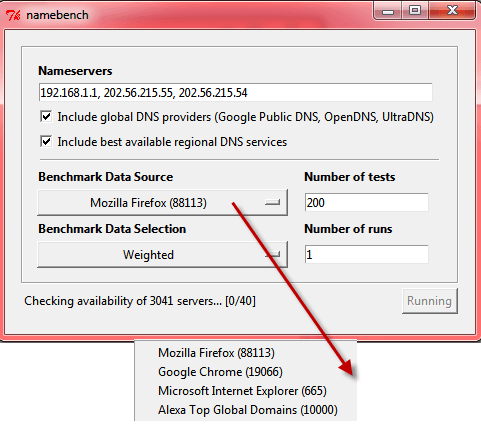
#Dns namebench download
So close your browser, close Steam or any gaming platform that could start updating games or download data. Don’t surf the internet while the benchmark is running, we do not want our test results being influenced by any traffic. Now, before you hit Start Benchmark make sure you don’t have any downloads running or anything producing traffic on your network. We will leave the rest of the options as they are.
#Dns namebench Pc
Now that you know what DNS servers to use, setting the DNS server for your PC is very simple. The report also provides the IP addresses of the DNS providers the benchmark shows had the best performance in the top right. In my case, OpenDNS was 36.5% faster than my current DNS provider. But you can still test the performance of Cloudflare DNS by simply entering 1.1.1.1 in the nameservers box.

Choose whether you want to include global (like Google DNS) and regional DNS services, your data source (probably Firefox) and the Benchmark Data Selection. As such, it does not include 1.1.1.1 as part of the list of global DNS providers. Simply download the file and run it, and Namebench will open without installation.
#Dns namebench free
Tip 2: This utility was created before Cloudflare entered the free public DNS market.

Tip 1: You may want to adjust the number of queries to speed up the benchmark results. If you’re looking for a public DNS server that is customizable and includes filters, you might want to check out our article on helping to protect your kids from questionable content using OpenDNS.

The utility will start up automatically.Īdjust the Query Data Source to a good sample set for your usage and click Start Benchmark and after a few minutes a the report will generate and open in your browser. If you’re looking for a method to help find a faster DNS server for your system, Namebench is a cool free utility to help you out. Then, run the downloaded EXE and hit the Extract button. To get started, head over to and download the latest version for your platform. Once you run the utility, a report will be generated with a personalized DNS provider recommendation. Now there is an even better solution using a free utility called NameBench developed by Google to automatically test the performance of all of the popular DNS providers for your location.
#Dns namebench how to
I also covered how to manually test the performance of a DNS provider to make sure you select the best one that gives you the best performance. In the past, I have written about how you can speed up your browser simply by changing your DNS servers to OpenDNS, an alternative to the DNS servers provided by your internet service provider. The result is a lot of domain resolutions, which makes the performance of your DNS provider critical to your web browsing speed. Many of these requests for resources go to different domains which also must be resolved before the browser can download the file. Once the page is downloaded, it is processed by the browser, which then can trigger hundreds of downloads as the various resources on the page are fetched. When you type in a domain, such as, your browser must resolve the address into an IP address so your computer can talk to the site's server and download the web page. DNS (Domain Name Service) plays a critical role in the operation of all web browsers.


 0 kommentar(er)
0 kommentar(er)
